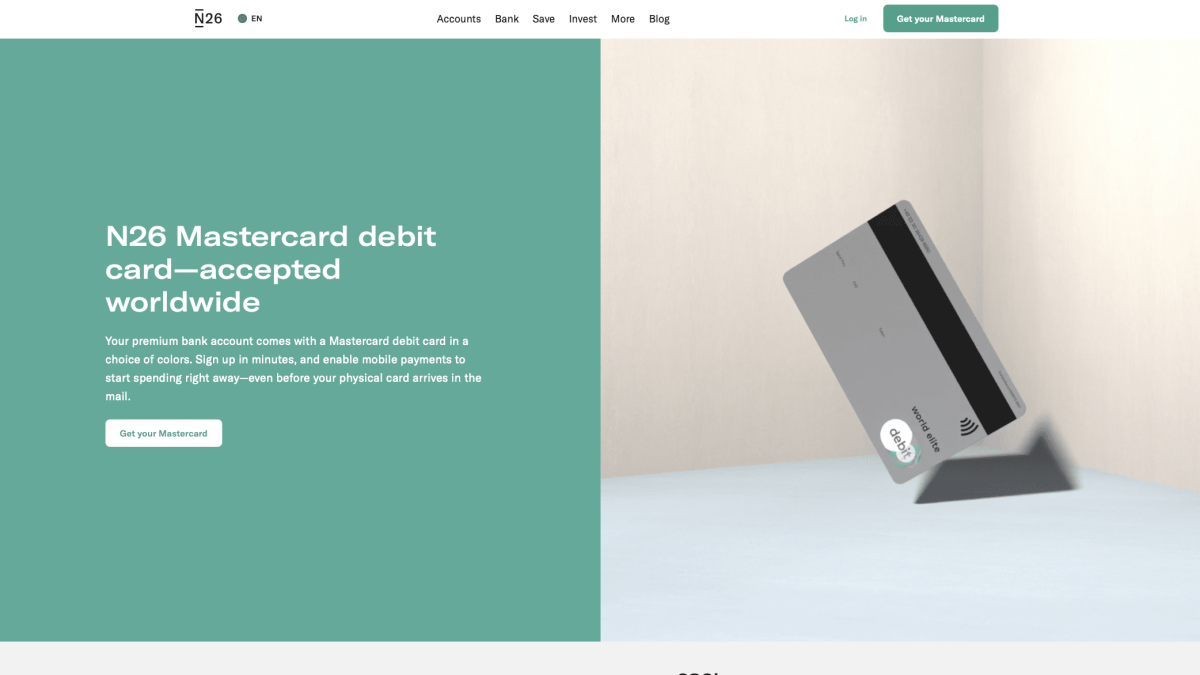N26 Credit Card Review: A Comprehensive Guide for Users in Germany
- N26 Credit Card Review: A Comprehensive Guide for Users in Germany
- Overview of N26 Credit Card Features
- Pros and Cons of the N26 Credit Card
- Comparison with Traditional Banks: N26 vs. Deutsche Bank, Commerzbank, and DKB
- Credit Limit Comparison
- Application Process for N26 Credit Card in Germany
- Security Features of N26 Credit Card
- User Reviews and Customer Feedback on N26
The N26 credit card offers a digital-first approach, making it highly attractive for tech-savvy individuals who prioritize convenience, low fees, and flexible management via mobile. Known for its streamlined app and transparent fee structure, N26 has become a popular choice among residents and expats in Germany.
In this review, we’ll compare the N26 credit card against more traditional German banks, including Deutsche Bank, Commerzbank, and DKB, to help you understand how N26 stacks up regarding ease of use, costs, credit limits, and customer support.
Pros of N26:
- No annual fees for the basic card.
- Real-time notifications and biometric login for enhanced security.
- No foreign transaction fees, making it ideal for travelers.
Cons of N26:
- No traditional credit line, as it functions similarly to a debit card.
- Limited customer service options, as support is primarily digital.
- Lack of in-person branch access, which may not suit everyone.
Through a side-by-side look at each bank’s offerings, credit limits, and support options, we’ll explore if N26 is the right choice for your banking needs in Germany.
Overview of N26 Credit Card Features
N26, as a digital bank, offers several unique advantages, focusing on simplicity, transparency, and accessibility. Here’s a breakdown of the N26 credit card’s main features:
- Zero Annual Fees: The basic N26 account is free, with zero annual fees for its standard Mastercard.
- Real-Time Notifications: The N26 app sends instant notifications for all transactions, ensuring immediate visibility of purchases and payments.
- Mobile-Friendly Banking: The N26 app provides full control over your finances, with spending statistics, budgeting tools, and even options to set savings goals.
- Foreign Transaction Fees: There are no fees for purchases in foreign currencies, making N26 a good option for international travelers.
- Security Features: Cardholders can lock or unlock their cards from the app, control online and contactless payments, and set spending limits for added security.
Pros and Cons of the N26 Credit Card
Pros:
- No Annual Fee: The basic N26 Mastercard is free, making it an affordable choice compared to many traditional bank credit cards.
- Flexible Spending Controls: Through the app, users can manage spending limits, online payments, and ATM withdrawals.
- Seamless Integration with Digital Wallets: N26 integrates smoothly with Apple Pay and Google Pay, offering additional convenience for mobile payments.
- Multi-Language Support: N26 provides support in English and other languages, making it expat-friendly.
Cons:
- No Overdraft Facility: The standard N26 Mastercard does not come with a credit line, operating more like a debit card.
- Limited Customer Service: N26’s support is primarily digital, and response times can vary. Some users report a preference for traditional customer service channels.
- Limited Physical Branch Access: As a digital bank, N26 does not have physical branches, which may not suit those who prefer in-person banking services.
Comparison with Traditional Banks: N26 vs. Deutsche Bank, Commerzbank, and DKB
While N26 provides a modern banking experience, it’s essential to compare its offerings with those of established traditional banks. Here’s how N26 stacks up against Deutsche Bank, Commerzbank, and DKB credit cards:
1. Deutsche Bank Credit Card
Overview: Deutsche Bank is one of the largest and most established banks in Germany, offering several credit card options, including the standard Visa and the Deutsche Bank Mastercard Gold.
- Annual Fees: Standard cards come with fees of around €39 per year, while premium options can range up to €99 annually.
- Credit Limit: Deutsche Bank provides flexible credit limits based on the user’s financial background and credit score, often extending higher limits than N26’s standard offerings.
- Customer Service: Deutsche Bank offers in-branch support, phone, and online service, ideal for users who value face-to-face interactions.
- Additional Benefits: Premium cards from Deutsche Bank offer perks like travel insurance, emergency assistance, and purchase protection.
Pros of Deutsche Bank Credit Cards:
- Higher credit limits and overdraft options.
- Extensive branch network across Germany for in-person support.
- Premium cards offer comprehensive insurance packages and travel benefits.
Cons of Deutsche Bank Credit Cards:
- Annual fees can be high for premium cards.
- Foreign transaction fees apply to some cards, making them less ideal for international travel.
Best For: Those who value traditional banking support, higher credit limits, and travel perks.
2. Commerzbank Credit Card
Overview: Commerzbank offers a variety of credit cards, including the Commerzbank Classic Mastercard and the premium Gold Mastercard. Commerzbank is known for its strong customer service and wide range of account management options.
- Annual Fees: The Commerzbank Classic Mastercard has an annual fee of around €30, while the Gold Mastercard costs approximately €79.
- Credit Limit: Commerzbank provides credit limits based on financial assessment and offers a broader range of credit flexibility compared to N26.
- Additional Benefits: Commerzbank’s Gold Mastercard includes travel insurance, purchase protection, and other perks tailored to frequent travelers.
Pros of Commerzbank Credit Cards:
- Flexible credit limits and overdraft options.
- In-person support and a large branch network across Germany.
- Premium cards offer additional insurance and travel benefits.
Cons of Commerzbank Credit Cards:
- Annual fees for most cards, even for basic options.
- Foreign transaction fees apply for purchases made in non-Euro currencies.
Best For: Individuals who prefer traditional banking with the security of face-to-face support and a variety of premium options.
3. DKB Credit Card
Overview: DKB (Deutsche Kreditbank) is an online-focused bank but has been around for decades, gaining trust for its strong digital banking services. Its DKB Visa card is popular among users seeking a mix of digital and traditional banking services.
- Annual Fees: The DKB Visa card is free if you have a DKB checking account, making it one of the more cost-effective options.
- Credit Limit: DKB offers flexible credit limits depending on the user’s income and credit history, typically offering more flexibility than N26.
- Additional Benefits: The DKB Visa card includes perks like travel insurance, interest-free payments for certain purchases, and reduced fees for international transactions.
Pros of DKB Credit Cards:
- No annual fees for DKB checking account holders.
- Excellent online and app support with additional travel perks.
- Flexible credit limit that adjusts based on financial history.
Cons of DKB Credit Cards:
- Limited physical branch presence, as DKB is primarily digital.
- Some restrictions apply for international fee waivers, especially for non-EU transactions.
Best For: Digital banking enthusiasts who want the benefits of an established bank’s credit card without annual fees and with flexible international perks.
Best Bank In Germany
Credit Limit Comparison
One of the essential factors to consider when choosing a credit card in Germany is the credit limit:
- N26: As a digital bank, N26 does not offer traditional credit limits on its basic card but provides an N26 You account that operates with set spending controls.
- Deutsche Bank: Credit limits are more flexible, with premium cards offering high credit ceilings based on credit scores and financial background.
- Commerzbank: Offers a range of credit limits, typically higher than N26’s basic offerings, and adjusts limits based on credit history.
- DKB: Provides flexible limits for Visa cardholders, with options to increase based on financial assessments.
Application Process for N26 Credit Card in Germany
Applying for an N26 credit card is straightforward, with the entire process done through their app or website:
- Download the N26 App or visit their website.
- Provide Personal Information: You’ll need a valid ID (passport or German ID card) and basic details, including your address and phone number.
- Complete Identity Verification: N26 uses video identification for verification, which takes only a few minutes.
- Choose Your Plan: N26 offers different account options, including N26 Standard, You, and Metal.
- Receive Your Card: Once approved, your card will be sent to you within a few days, ready to activate through the app.
Eligibility for Expats and Non-EU Residents: N26 is particularly popular among expats in Germany, as the application process is accessible in multiple languages, including English. Non-EU residents are welcome, though they may need a valid German residence permit and German address.
Security Features of N26 Credit Card
N26 provides several advanced security measures to protect your account and card usage:
- Real-Time Notifications: Get instant notifications after each transaction, ensuring immediate awareness of any unauthorized activity.
- Biometric Login: Secure your N26 app with fingerprint or facial recognition.
- In-App Card Locking: Temporarily lock and unlock your card directly from the app.
- Spending Limits: Set spending limits and control online and contactless payments.
- Two-Factor Authentication: N26 uses two-factor authentication for online purchases, safeguarding your information from fraudulent access.
User Reviews and Customer Feedback on N26
N26 generally receives positive reviews for its seamless digital banking experience, with users particularly praising:
- Ease of Use: The intuitive app layout and helpful features make it accessible for new users and digital banking enthusiasts alike.
- Expeditious International Use: Users who frequently travel or live abroad appreciate the lack of foreign transaction fees, making it cost-effective for international purchases.
- Convenient Account Management: With real-time transaction updates, it’s easy to manage finances and keep track of spending.
However, some users highlight the challenges of customer support due to its digital-only format. While support is available via live chat and email, response times can vary, and in-person support is unavailable.
In conclusion, the N26 credit card offers an accessible, low-cost option that’s ideal for users who prioritize digital convenience and frequent travel without the hassle of foreign transaction fees.
Compared to traditional banks like Deutsche Bank, Commerzbank, and DKB, N26 excels in its app-based interface, zero annual fee, and real-time spending controls.
However, it lacks the traditional credit line and in-person service support found in these banks, which may be preferred by those needing personal consultations or larger credit limits.
Overall, N26 is an excellent choice for modern, flexible banking but may not be the best fit for individuals seeking high credit limits or extensive customer support.
How informative was this article?
Click on a star to rate it!
We are sorry that this post was not useful for you!
Let us improve this post!
What is missing in the article?















